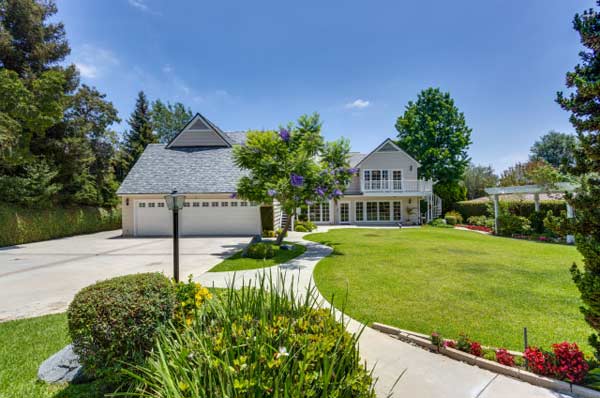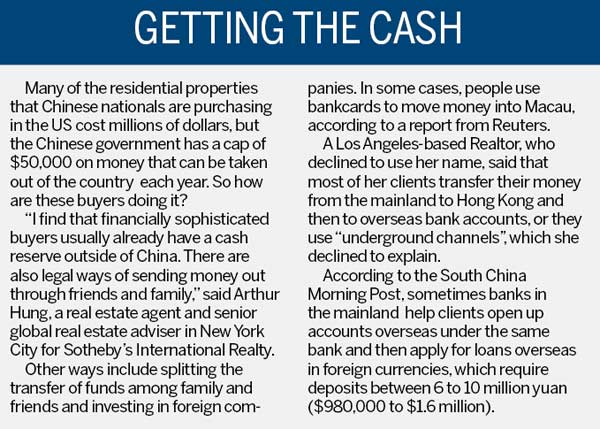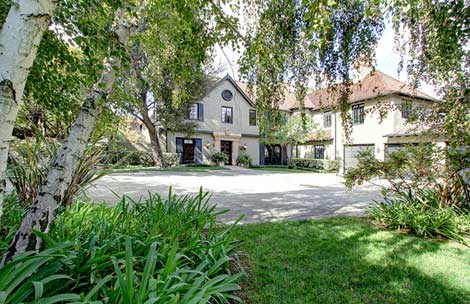In California: Cash, Cash, Cash
Updated: 2014-10-24 12:00
By Amy He(China Daily USA)
|
|||||||||
 |
|
nother property in San Marino, with an asking price of $7.8 million. The house has six bedrooms and 6.5 baths. Provided By Coldwell Banker Residential Brokerage |

Higher-income buyers
"There's been a lot of challenges for domestic buyers who require getting loans and competing with a lot of these all-cash offers," he said. "That has driven up prices because you have these individuals who have the capability of paying all cash coming into the market."
Higher-income buyers and cash buyers are pricing out first time buyers, said Susan Wachter, professor of real estate and finance at the Wharton School of Business of the University of Pennsylvania.
"When you talk about higher income buyers, it's not just buyers from China, and it depends on the market, but buyers from China are certainly part of it. In those markets they are the drivers," she told China Daily.
There have always been all-cash buyers in the US looking to purchase a first or second home, and they often seek a discount. But now Chinese buyers paying cash are not seeking a discount and often go beyond the asking price, pushing out other buyers. There are also multiple all-cash Chinese buyers bidding after the same property, contributing to rising costs, according to Wong of the AREAA.
He said his wife is also a real estate agent and that she had two Chinese buyers recently pay cash. "When they made their offers, both were $100,000 over the asking price - and this was in San Francisco - and both of them closed escrow within 10 days," said Wong, who is also a San Francisco-based real estate agent and a broker associate at Better Homes & Gardens Mason-McDuffie Real Estate.
While all-cash buyers are desired by sellers and agents, those seeking to finance with a mortgage - even foreign buyers - are finding many lenders have become more stringent with financing requirements, said Arthur Hung, senior global real estate adviser and Realtor at Sotheby's International Realty in New York.
Many Chinese initially inquire about financing, only to find it's very difficult to get it, either because there is a loan limit on the purchase or the application process requires a lot of documentation that the buyers cannot provide, he said. "Or the processing time will be so long that it affects the closing and it's not possible for the seller, so a lot of people will - even though they initially ask about mortgage financing - pay in cash."
Key real estate markets in the US have bounced back since the financial collapse in 2008 with the bursting of the housing bubble, but many have recently slowed.
The National Association of Realtors (NAR), a trade group, said in an August report that home prices increased 4.4 percent in the second quarter of 2014 compared to a year before, the slowest growth since 2012. But markets where Chinese buyers are key players have not seen prices slow, said Wachter.
"Several markets where Chinese investment is particularly important, [prices have] not slowed. These markets continue to accelerate. So depending on the market, investment from China has been responsible for rising prices," she said. "In real estate, the marginal investor is the investor that gets the property, and determines pricing in the market. Investors from China often are that marginal investor that's bidding on the property, has the highest bid and is in fact setting prices in that market."
Real estate is priced by what the market is willing to pay, and the highest bidder determines the price of a property. In many markets, particularly on the West Coast in cities like Vancouver or San Francisco, bids are backed by investment from China and, therefore, the Chinese are determining the prices in those markets, Wachter said.
In June, the NAR said that between April 2013 and March 2014, foreign buyers contributed $92.2 billion in sales volume, roughly 7 percent of total US housing market sales.
That was a 35 percent increase from the prior year, which beat a previous $82.5 billion record in 2012, and was due in part to a 50 percent jump in Chinese-buyer activity, the NAR said.
Total international sales
The association estimated that total international sales from Chinese buyers rose to $22 billion in the 12 months ending in March 2014, up from $12.8 billion in the prior period. "This accounts for about 24 percent of the total international dollar sales," according to the report. It said that 51 percent of Chinese purchases were in California, Washington state and New York City, and more than 70 percent of those were all-cash purchases.
The data compiled from 3,547 surveys conducted with international buyers in the US between April and May of 2014 showed that about half the purchases made by the Chinese were for vacation/residential properties.
Chinese accounted for the largest sales-dollar volume, the NAR said, because they tended to purchase properties in higher-priced markets along the coasts.
China is the fastest-growing source of clients in the US, and the second-largest foreign buyer group, right behind Canada and in front of Mexico and the UK, according to the NAR.
"Chinese purchases are across the board - it's commercial, condos, residential, and there's also absolutely commercial investment," Wachter said.
Chinese companies and individual investors are increasingly looking to diversify their assets and US real estate is seen as largely a safe investment.
"The US is not only a diversifying asset, it appears to be the best of both worlds: the US market is growing, and at the same time, it's a safe market to invest in," said Wachter.
" The market in China appears to be soft and in many markets in China, prices are falling, so there's great uncertainty. There's less uncertainty about pricing in the US market than in China at this moment," she said.
"In a world where interest rates are as low as they are, single digit returns at the 3 to 4 percent level are excellent returns. That's why Chinese are choosing to invest in real estate here," Wachter said.
Real estate prices are also cheaper in the US than they are in China, another reason why Chinese buyers are attracted to the US market.
"[It's] significantly cheaper. Maybe in New York, it'll be three-quarters the price of what you can get in Beijing and Shanghai, and it has been this way for many, many years," said Wong of AREAA.
But experts have been cautious to say that the Chinese are not necessarily creating a housing bubble, despite what some media reports have claimed.
"A bubble is too strong a term at this point, but we can see that prices are increasing, and in some markets, they're exceeding levels at the previous high," Wachter of the Wharton School said.
"It's not a bubble in a classic sense - prices have to collapse from where they are now. There's nothing in the mechanics of where prices are today that's pointing to a necessary collapse in the next year or so," Wachter said.
Chinese buyers are all-cash buyers who often don't take on as much debt, and if they do, they are paying 35 to 50 percent down payments, Wong said.
"They're not going to let their properties get foreclosed and are not going to walk away from their properties," he added. "I'm very confident that the foreign influx of buyers will not create a bubble."
Contact the writer at amyhe@chinadailyusa.com.
Most Viewed
Editor's Picks

|

|

|

|

|

|
Today's Top News
Accord reached on Asia infrastructure bank
Civil service exam hit amid corruption crackdown
'Miracle' premature baby ready to go home
Minister praises China's vision over AIIB
China pledges $81.7m aid to Africa
Occupy Central not democracy: former Malaysian PM
iPhone loses subsidies in China
China's economy showing expansion
US Weekly

|

|
















